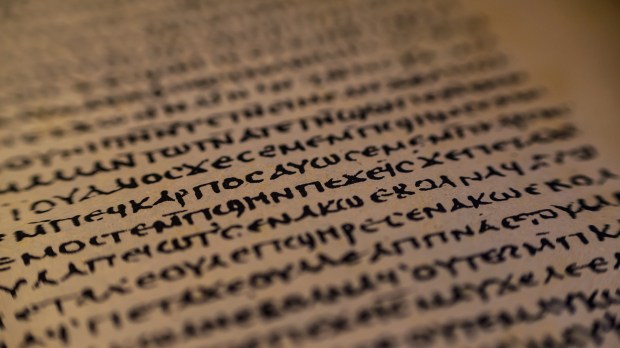Even if you are not aware of it, you speak some Greek daily. If, for instance, you find your handwriting unreadable and realize you need to work on your calligraphy, you’re speaking some Greek: calligraphy derives from the Greek kallos, “beauty,” and the verb graphein, “to write.” If you are not feeling too well and think you need to see your gastroenterologist, you are speaking a bit of Greek again: gastro is the Greek word for “stomach,” and enteron is the word for either intestine or, more broadly, simply “gut.”
Plenty of words in everyday use (not to mention the long list of more discipline-related terms found in philosophy, theology, law, medicine, and other sciences) are indeed Greek. That means that if you’re thinking about learning some of it, you will not necessarily be starting from scratch. In fact, you might eventually discover you have a better grasp of some basic Greek vocabulary than you think. Even more so, if you happen to be a Christian: since the Gospels were written in Greek, plenty of the words used in liturgy, prayer, or in overall Christian culture might not necessarily have been fully translated into your mother language. Have you ever considered, for instance, where the word “ecclesiastic” comes from?
Here, we want to present you with five rather common words you might be familiar with, and with their meanings in the original Greek.
Eukharistós: The original Greek word for “Eucharist,” is still used today (in Greece, that is) to thank someone. If you walk into a Greek restaurant, make sure to thank your server by saying “eukharistós.” Commonly translated as “thanksgiving,” and referring to the Lord’s Supper, the Greek word “eukharistós” is a composite of the prefix eu, “well” (as in “Eugene,” meaning “the well-born”) and kharizesthai, a verb meaning “to show favor.” This verb is itself derived from the word “kharis,” meaning “favor,” or “grace.” In fact, it is from this “kharis” that we get our word “charity.”
Ekklesia: In most Latin languages, one can still see the original Greek word ekklesia (meaning “gathering”) in the words used to refer to the Church. The Spanish “iglesia,” the Italian “chiesa,” and the French “église” still preserve some of the original sound of the Greek word. The English “church,” however, derives from another Greek expression, kuriakon doma, “the House of the Lord,” to refer to the same assembly.
Agape: There are more than four words for different kinds of love in Greek. This kind of love, agape, is a very specific one, and the Church identifies it with the love of God for humanity and of humanity for God, a love that resembles charity in its unconditional gratuity. Some etymologists claim the word includes an intensifying prefix, aga, which would make the word mean something like “to love greatly.”
Kyrie: This one deserves a bit more of a relatively “technical” approach –as it would help us kill two birds with one stone. Kyrie is the vocative case of Kyrios, which translates “Lord.” Broadly speaking, a vocative expression is a direct address by which the identity of the party spoken to is set forth expressly within a sentence. Since Kyrios is one of the titles given to Christ in the New Testament, it is repeated with relative frequency all throughout the Gospels. And you might be acquainted with the vocative form Kyrie (and not with the nominative Kyrios) since it is commonly repeated in a rather popular (and important) prayer of Christian liturgy, the Kyrie eleison –literally, “Lord, have mercy,” an expression derived from a Biblical phrase that is found often in the Psalms and in Matthew’s and Luke’s Gospels. This is one of the most often repeated phrases in Eastern Christianity, including the Eastern Orthodox, Oriental Orthodox, and Eastern Catholic Churches, Coptic Christianity included.
Kairos: Whereas in modern Greek kairos might mean either “time” or “weather,” in ancient Greek the word had different, more specific connotations. Both in classic literature and in the Gospels, kairos means the right, critical, or opportune moment. Just as ancient Greeks had around five words for love, kairos is one of the two words that they had for “time” –the other being chronos, used to refer to sequential (that is, chronological) time. The difference between one and the other is ostensibly qualitative. Whenever the word kairos appears you know something big is about to happen – no wonder the word is used 86 times in the Gospels. In the New Testament, kairos means the time when God acts. For example, in Mark 1:15 we read that “the time (Kairos) is fulfilled and the kingdom of God is at hand.” In John 7:6, Jesus distinguishes “His” time from that of “His brothers’” referring to the difference separating chronos from kairos. In Eastern Orthodox and Eastern Catholic churches, before the Divine Liturgy begins, the deacon exclaims to the priest, Kairos tou poiēsai tō Kyriō, “It is time (kairos) for the Lord to act,” explaining that the Liturgy is the point of intersection of time with Eternity.



